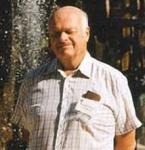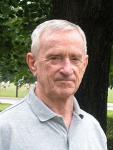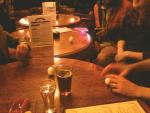 William R. CorlissOne of the most interesting and scientifically-important people I ever met was the independent scientist William R. Corliss. Since the 1970s, he was by far the world's finest collector, categorizer, and ranker of scientific anomalies. He made himself the world's greatest authority on things that don't fit the paradigms of the times.
I had a long meeting with him in 1988, and corresponded several times with him afterward. He was always a scrupulous scientist and a quiet, reserved, proper gentleman. Bill died of a heart attack on July 8th, age 84.
Bill experienced organized Skeptics as debunkers, enforcers for mainstream-paradigm-as-law, and thus enemies of anomalies. He definitely recognized that some claims are indeed bunk, deserving and needing debunking.
Science always notices a lot of things, and it takes time to fit these pieces into the puzzle - sometimes months, sometimes centuries. Until they fit, the odder pieces are anomalies. Narrow-minded swallowers of paradigms-they-are-taught ignore them whenever possible, and pooh-pooh them when th
William R. CorlissOne of the most interesting and scientifically-important people I ever met was the independent scientist William R. Corliss. Since the 1970s, he was by far the world's finest collector, categorizer, and ranker of scientific anomalies. He made himself the world's greatest authority on things that don't fit the paradigms of the times.
I had a long meeting with him in 1988, and corresponded several times with him afterward. He was always a scrupulous scientist and a quiet, reserved, proper gentleman. Bill died of a heart attack on July 8th, age 84.
Bill experienced organized Skeptics as debunkers, enforcers for mainstream-paradigm-as-law, and thus enemies of anomalies. He definitely recognized that some claims are indeed bunk, deserving and needing debunking.
Science always notices a lot of things, and it takes time to fit these pieces into the puzzle - sometimes months, sometimes centuries. Until they fit, the odder pieces are anomalies. Narrow-minded swallowers of paradigms-they-are-taught ignore them whenever possible, and pooh-pooh them when th
3 Stories That WERE Too Good To Be True
Submitted by
Norm Sperling
3 articles in 3 days have exposed hoaxes and scams.
A bizarre story claiming that users of Microsoft's Internet Explorer browser are a lot dumber than users of Firefox, Chrome, and Opera, was unmasked in a day or 2. Wired's Epicenter reveals the hoax and sparks its perpetrator to claim it was a joke.
The horrifying "collar bomb" in Sydney, Australia, was a hoax. Who concocted it?
For 140 years, Scots have been proud of their unbelievably-loyal dog, Greyfriars Bobby. Reuters reports that it was a "scam to lure tourists".
Do the media you read tell you the initial claim, but not that it was a hoax? Time to smarten your news sources.
Bay Area Skeptics and Religion
Submitted by
Genie
From time to time, Bay Area Skeptics board members are asked about BAS's position on religion. We have a brief mission statement that explains our policy of religious neutrality, but like all such statements, from time to time one must consider whether it is communicating fully the organization's perspective. You can read it at http://www.baskeptics.org/about/policies
In recent correspondence with a friend about the topic of skepticism and atheism, I wrote the following, which, although not an official BAS statement, reflects what most (though not all) of the BAS officers have thought over the years. For what it's worth -- here are some additional thoughts on the matter:
Dear _____,
People on my side of the issue want skepticism to be about appreciation and enjoyment of science, and critical thinking, which of course is not philosophy-specific. After all, if your concern is showing people scientifically why homeopathy is quackery, religion isn't an issue. And skeptics are more concerned with things like homeopathy than with the meaning of life. This doesn't prohibit us from evaluating/criticizing fact claims made in the name of religion if such claims are shown to be wrong through science. We can show through science why the catastrophic cut
Karen Stollznow Hits Wikipedia’s Front Page
Submitted by
Norm Sperling
On July 24th, Wikipedia's "Did You Know" section (front page, lower left) included "... that Karen Stollznow writes for two skeptical magazines Karen Stollznow(Skeptic and Skeptical Inquirer) and hosts two skeptical podcasts (Point of Inquiry and Monster Talk)?". Stollznow has been an active member of the Bay Area Skeptics board for several years, helping the organization use online media more effectively, among other things. Wikipedia's front-page notice helped her new article jump from 20-ish hits a day to 1,100!
To read more about her, check out her Wikipedia page.
Thunderf00t Strides Into Berkeley
Submitted by
Norm Sperling
Sometimes we know in advance that someone of interest to skeptics will be coming to the Bay Area, and sometimes we have to take advantage of a last-minute opportunity. One such opportunity came up on Saturday, July 23, 2011, when YouTube video producer-extraordinaire Thunderf00t was our guest at Skeptics in the Pub. About 25 people were able to attend on short notice at Jupiter, in downtown Berkeley, for conversation, food, and drink. Thunderf00t has produced a series of YouTube videos which have been viewed by hundreds of thousands. His series, "Why people laugh at creationists", is widely considered a useful (and entertaining) compendium of refutations to creationist arguments. It alone has received millions of hits. We had a good time talking about the varieties of science topics Thunderf00t's site considers. BAS hopes to take advantage of other visitors; please let us know if you know of any person of skeptical interest coming to town.
-- Genie Scott
The Textbook League fought pseudoscience and other idiocy in pre-college textbooks for the last few decades. The human part of the League is disbanding, but stalwart ichthyologist Bill Bennetta is personally keeping their website online: http://www.textbookleague.org . Their reference material remains available even though they no longer send experts galloping to assorted rescues.
Do cell phones cause brain cancer?
Submitted by
Genie
Although we try at the BAS website to blog about Bay Area issues, sometimes national issues are so important they swamp our local focus.  Dr. Robert Park
The issue of cell phone radiation and cancer is one of them. Of course, as members of society, Bay Area residents are tuned into this controversy as well, so perhaps it is not inappropriate to comment on it.
Do cell phones cause brain cancer? There is no epidemiological evidence to suggest the link, only anecdote (and two anecdotes, despite the common practice in the press, do not constitute "data"). Is there a reason to suspect that cell phone radiation -- close to the brain, and in the case of many heavy cell phone users, as much as several hours/day -- might be dangerous?
Well, no. Not according to basic physics. Few people have been as clear on this issue as beloved skeptic Bob Park (though the irascible Park would probably grump about being termed "beloved", but it's true!) Author of "Voodoo Science" and
Dr. Robert Park
The issue of cell phone radiation and cancer is one of them. Of course, as members of society, Bay Area residents are tuned into this controversy as well, so perhaps it is not inappropriate to comment on it.
Do cell phones cause brain cancer? There is no epidemiological evidence to suggest the link, only anecdote (and two anecdotes, despite the common practice in the press, do not constitute "data"). Is there a reason to suspect that cell phone radiation -- close to the brain, and in the case of many heavy cell phone users, as much as several hours/day -- might be dangerous?
Well, no. Not according to basic physics. Few people have been as clear on this issue as beloved skeptic Bob Park (though the irascible Park would probably grump about being termed "beloved", but it's true!) Author of "Voodoo Science" and
 Dr. Robert Park
The issue of cell phone radiation and cancer is one of them. Of course, as members of society, Bay Area residents are tuned into this controversy as well, so perhaps it is not inappropriate to comment on it.
Do cell phones cause brain cancer? There is no epidemiological evidence to suggest the link, only anecdote (and two anecdotes, despite the common practice in the press, do not constitute "data"). Is there a reason to suspect that cell phone radiation -- close to the brain, and in the case of many heavy cell phone users, as much as several hours/day -- might be dangerous?
Well, no. Not according to basic physics. Few people have been as clear on this issue as beloved skeptic Bob Park (though the irascible Park would probably grump about being termed "beloved", but it's true!) Author of "Voodoo Science" and
Dr. Robert Park
The issue of cell phone radiation and cancer is one of them. Of course, as members of society, Bay Area residents are tuned into this controversy as well, so perhaps it is not inappropriate to comment on it.
Do cell phones cause brain cancer? There is no epidemiological evidence to suggest the link, only anecdote (and two anecdotes, despite the common practice in the press, do not constitute "data"). Is there a reason to suspect that cell phone radiation -- close to the brain, and in the case of many heavy cell phone users, as much as several hours/day -- might be dangerous?
Well, no. Not according to basic physics. Few people have been as clear on this issue as beloved skeptic Bob Park (though the irascible Park would probably grump about being termed "beloved", but it's true!) Author of "Voodoo Science" and
Water and Placebos DO Have Effects
Submitted by
Norm Sperling
by Norman Sperling, May 15, 2011
Some substances that are usually regarded as having no effect actually do have effects.
* Water, as in homeopathic treatments.
* Placebos, as in medical tests and treatments.
I have seen homeopathic treatments strongly criticized as being useless and having no effect, because they’re "only" water. Yet water itself has many effects.
* Peeing usually makes you feel better.
* Drinking a lot of water is recommended for several medical and nutritional situations. It is suspected to dilute or flush precipitates that would otherwise form painful kidney stones, for example.
* And drinking a lot is often recommended in treating colds and other illnesses.
So plain old water, whether labeled homeopathic or not, CAN have effects.
"Placebo" is Latin for "I make you feel good". That’s an effect, not the absence of one. (By that centuries-old definition, boyfriends and girlfriends are placebos.)
In the last half century, "placebo"’s definition and applications have changed importantly several times, but discussions rarely specify which version is meant. Always check just what speakers and writers mean by the term.
Placebos are rarely neutral and rarely have zero effects. Many different substances that have been used as placebos have known effects.
* Sugar, as in "sugar pills", makes people feel better. Huge quantities of sugary
 Did you know you can balance an egg on the Equinox?! Wow!! And this year, with the gravitational pull of the "super Moon", or something, the powers should be even stronger, or something, and eggs should be balanceable even more easily!
Well, the Bay Area Skeptics in the Pub for March 19 -- OK, the day BEFORE the actual card-carrying equinox -- found egg balancing possible, but something of a chore. This picture shows three eggs balanced at the same time, which I think was a record. The dozen eggs we had to work with seemed almost symmetrical, with none of the "bottom heavy" morphology most eggs have. Balancing them was much more difficult than other eggs at previous BAS spring rituals.
At the next SitP, we'll try again to balance eggs, and I'll report back.
(Because indeed, one can balance eggs on the Equinox, and any other day, as well. Phil Plait's Bad Astronomy blog discusses Martin Gardner's history of how this Chinese folk ritual became an American urban legend:
Did you know you can balance an egg on the Equinox?! Wow!! And this year, with the gravitational pull of the "super Moon", or something, the powers should be even stronger, or something, and eggs should be balanceable even more easily!
Well, the Bay Area Skeptics in the Pub for March 19 -- OK, the day BEFORE the actual card-carrying equinox -- found egg balancing possible, but something of a chore. This picture shows three eggs balanced at the same time, which I think was a record. The dozen eggs we had to work with seemed almost symmetrical, with none of the "bottom heavy" morphology most eggs have. Balancing them was much more difficult than other eggs at previous BAS spring rituals.
At the next SitP, we'll try again to balance eggs, and I'll report back.
(Because indeed, one can balance eggs on the Equinox, and any other day, as well. Phil Plait's Bad Astronomy blog discusses Martin Gardner's history of how this Chinese folk ritual became an American urban legend:
Series on Wakefield Immunization Scandal
Submitted by
Genie
 Anyone interested in the scandalous story of Andrew Wakefield, whose paper in the British journal Nature and further activities have spurred the antivaccination movement, would be interested in Adam Rutherford's report on BBC Radio 4. The second part of the series airs tonight, March 24. Here's the link: http://www.bbc.co.uk/programmes/b00zm328
Anyone interested in the scandalous story of Andrew Wakefield, whose paper in the British journal Nature and further activities have spurred the antivaccination movement, would be interested in Adam Rutherford's report on BBC Radio 4. The second part of the series airs tonight, March 24. Here's the link: http://www.bbc.co.uk/programmes/b00zm328
